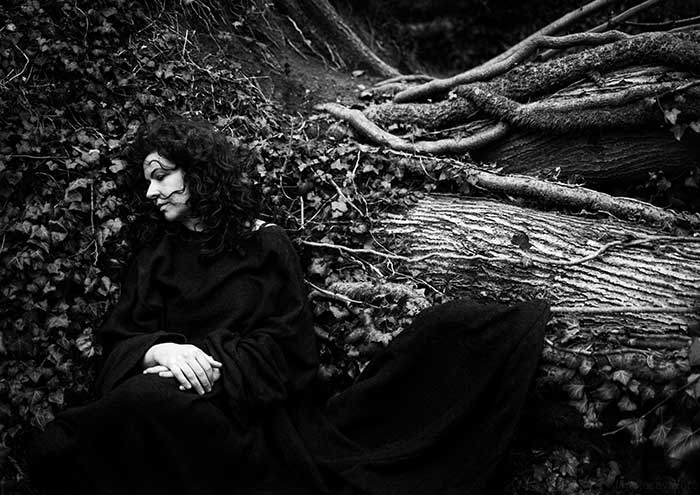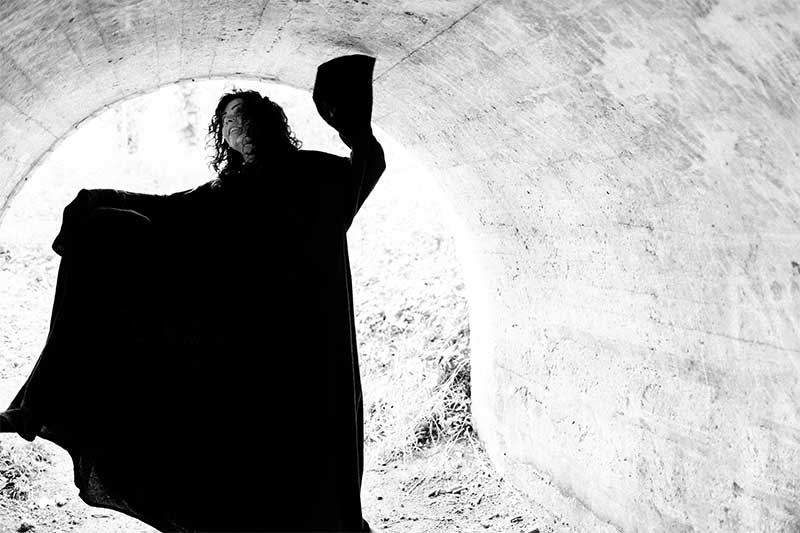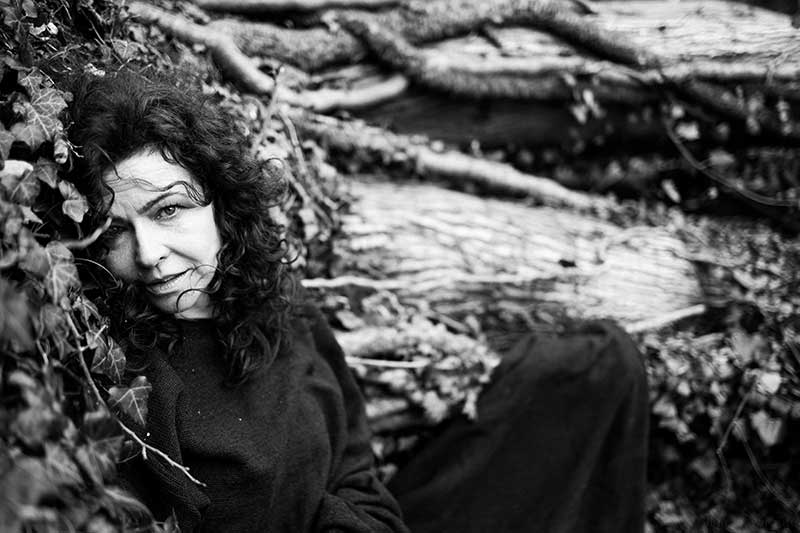
‘We spin this stuff from our fingers like gold thread, you and I.’ That’s the way an interview should proceed. For tousle-haired singer-songwriter Polly Paulusma, her sixth studio album Wildfires (TPLP1892CD) plays for nearly two sleekly-tuned hours – that is, six vinyl sides. That’s a lot. She opens brightly with ‘Hello Andy, happy to contribute, what kind of things were you thinking?’ And there’s a lot of thinking involved.
First single, ‘Paper Cathedral’, has Jon Thorne’s deep upright bass thrum and her own guitar layering as she asks ‘pass me the matches, help me set it on fire, this paper cathedral made of words and of wire.’ Metaphorically, she’s igniting the flames of a doomed relationship. It’s a major song. ‘It’s about whatever you think it’s about’ she counters. ‘Yes of course, I’ve heard a few different interpretations – loss of religion, divorce, and this really makes me happy, because I think a successful song explodes out of the writer’s heart and head and lives in people’s hearts and heads because it comes to mean something to the listener. If I proscribe what it means – ‘prescribe’?, always get those two muddled up, it’s only me saying what it meant to me at that moment of writing, and that’s hopefully one lone moment in its trajectory. If the song is alive, it grows in meaning.’

There seem to be clues in an online clip in which she illustrates ‘here’s an anatomy of a guitar part getting built.’ Not so. ‘No that is more in the production, that layering, once the song is written’ she explains. ‘Lyrics are different. I always write from life. I have no filter, no screen, much to my horror. And nothing is off limits. I can’t help but go deep. But I find I can say things in songs that perhaps I would never say talking with someone. It’s a different kind of truth. And not always head on. Sometimes it’s coming at it from an angle. But all these songs on this record are written in my own blood. As Joni would have it. Ha! No, in all seriousness, I think to put your truth into a song gives you so much license. Perhaps you can be forgiven for writing things into a song.’ As she sings in ‘Mad Girl’s Love Song No.2’, ‘there’s nothing to be said, that can’t be sung.’
To introduce the tracks on Wildfires, the tastefully sparse art-folk instrumentation is crafted and spliced with the unique idea of little spoken-word poetry ‘prologue’ pieces, amid sounds from caves and rivers. There are neo-classical intimations, pauses, footfall, ambient sounds, atmospheres, unheeded surges, a throb hung on the brink of eternity that preludes ‘Last Night I Had A Dream’ where her personal, intimate, conversational singing-style delineates possible futures full of Escher mirrors that go on and for ever, strewn with clues like books with torn-out pages. Did those prologue-interludes happen at the production stage? Or did they come out of live performance song talk-ins?
‘No, the songs were all written that way’ she reveals. ‘The prologues were there right from the get-go in one form or another. I am just proofing the accompanying book of lyrics, prose and poems for Wildfires and I wrote an essay all about it. Prose is often a part of my songwriting because so many songs come out of morning pages, free writing. So I’ve been pondering for a while on that quicksand moment when prose turns into song. Some of the prologues are the prose I was writing as the song emerged. Others stylise that moment. All the demos for these songs include them. I think of them as one unit.’
That’s fascinating, and yes, it interrelates. One idea sparks off the other. When you say ‘morning pages, free writing’ you mean that you have a jotter note-book, or a journal that you write ideas and lines and observations, maybe with little sketches too? ‘I’m referring specifically to a technique espoused by Julia Cameron in her book The Artist’s Way: A Spiritual Path To Higher Creativity (1992) – an amazing book for creatives – a twelve-week course in creative resuscitation, called the ‘morning pages’. You wake up each morning and write three pages of whatever comes into your head. Some days it’s garbage. Lots of whining. I need to do the laundry. I’m worried about my sister. That kind of stuff. But after about two pages you hit this amazing place and that’s where lots of my songs are born…. Or the seeds of them at least. You sort of get past yourself, get over yourself somehow. It’s incredible. Lots of creatives swear by them. I’ve been doing them on and off for twenty-five years. You might also call it stream of consciousness. But it’s a daily practice, and it’s on the repetition that it starts getting really useful, I have found. I have actually started doing them on Instagram live every morning at 6.45-7.15am Mon-Fri with a group of people, it’s helpful to have an appointment. Just quiet writing time.’
I’d not actually heard of Julia Cameron’s technique, but it’s obviously a productive method of kicking in your creativity. ‘There’s a song on my last album called ‘Bracklesham Bay’ where I first explored the idea of prologue-plus-song. It was like the springboard into this body of work. I like the idea of suggesting that there is really no boundary between musical prose and prosaic song. I’ve always read novels as if they are music, and revelled in the literariness of great songs. I see the distinction as arbitrary.’ Leonard Cohen is a poet, a novelist and a singer-songwriter. And Polly mentions the lovely Joni Mitchell as an example. Whereas Angela Carter approaches music through her mythic prose… ‘Also that Angela Carter was a folk singer…’ she points out.
As an early adapter, Polly shed-recorded her first album – Scissors In My Pocket (2004) at home on her computer, teasing through free downloads, linking and exploiting through iTunes, blogs and MySpace when social media was still in its infancy. Second album – Cosmic Rosy Spine Kites (2005) reconfigures the same tracks in much the same way that the title anagrams its title. Her 2021 album Invisible Music: Folk Songs That Influenced Angela Carter was spun off from her research into the novelist’s mythic retelling of folklore and fairytale through feminist-awareness, with readings from Kathryn Williams.
But from starting out largely autonomously, recording on her own computer at home, Polly is working with producer Ethan Johns for this album. Ethan’s curriculum vitae runs from Ray Lamontagne to Laura Marling to Ryan Adams. It must present a step change in working methodology. ‘Yes. It’s been amazing. Still pinching myself.’
How did that arrangement come about? ‘I approached him as a complete crapshoot and nearly fell off my chair when he said ‘yes’. But since meeting the creative workflow between us has been effortless. We had a shared vision for the record and never had a moment of disagreement or clash. He made me do scary things, sure, for example singing and playing at the same time to record, sounds innocuous enough but holy fuck it was terrifying, I’ve never recorded like that, not even with Ken Nelson who produced my second record. There was always a vocal day or two at the end, when you did all the vocals over the top of the tracks. But not this time. We just played live, a proper band, and that meant we could react and ebb and flow with each other, something building up track by track removes. Terrifying, liberating, it blew my mind. He’s an extraordinary musician and producer. Brought out the best in all of us. Neil Cowley the jazz musician is on keys. Fun fact – he had not heard any of the songs before. His performances are just pure reaction in the moment. Some of the tracks are first takes. He’s really wonderful.’
Some of that freshness comes across in the music itself. I hear it. ‘So glad you can.’
There’s a lot to take in. Is there one particular track you’d draw my attention to? ‘It’s definitely accumulative, it builds, and there’s a story through the whole thing, so you miss out to isolate a track. But – I understand, needs must. The very last track ‘Tiny Little Things’ is probably the most important. The final track of part one, ‘Scars’, is another pivotal moment. So, start with those if you need a quick in. If you get a long car or train ride that’s the best way to listen to it, I reckon. It unpacks itself. Eth’s a genius.’ ‘Tiny Little Things’ is piano-led with soft jazz-cool pulsing bass as she tick-boxes the everyday drudgery and routine of domestic images that – together, make up loving and living. ‘Scars’ is eerie strings that suture our wounds. Scars tell stories of guts and gore. Her voice rises, in delicate phrasing, yet forceful and vital as breath. Everybody hurts. We heal each other. This is precious.
Her own label, Wild Sound, extends to sign a roster of likeminded creatives. Her 2022 album The Pivot On Which The World Turns shifted sideways into the One Little Independent label, with her artfully sketched profile artwork. C’mon c’mon, c’mon it’s urging us to be ‘Luminary’.
I loved doing the research, enjoyed listening to Polly’s albums. ‘Haha! You are very kind, thanks for asking all the right questions. Thank you for taking so much trouble, much appreciated! Hope you have enough for what you need now?’
‘We spin this stuff from our fingers like gold thread, to fasten all the parts of us that might fall off as we spin through space.’ It’s been fun. I have way too much material for a short feature. Maybe I’ll use it somewhere else too. Stay tuned.
‘Thank you for asking and all my best,’ says Polly.

BY ANDREW DARLINGTON
.
